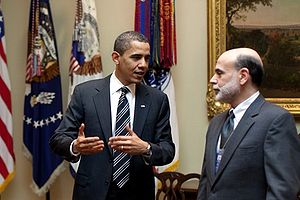| English: President Barack Obama confers with Federal Reserve Chairman Ben Bernanke following their meeting at the White House. (Photo credit: Wikipedia) |
Washington, Jul.12, stock market trading .- About ten days ago, I wrote a piece titled “The Fed Needs Us to Buy Stocks, Not Sell Them.” In it, I said that the Fed’s most recent monetary policy meeting, and Bernanke's subsequent press conference, were GOOD for stocks.
In fact, for anyone that doubted my interpretation of the facts, I made this point: I said, “Bernanke (the Fed) has committed trillions of dollars toward keeping the U.S. economy afloat in recent years, and has a vested interest in keeping stock values high and house prices on an upward trajectory. They would do nothing to jeopardize that.”
All the while, the voices from Wall Street, the journalists, the herd, were all making sure they were on record for calling a top in stocks (one of many tops they have called along the path from the March 2009 lows).
Why were they so wrong?
Because they don’t understand the environment within which we are operating. They don’t understand the Big Picture.
Financial markets in this crisis environment are driven by central banks. Period. Central bank policy is dictating stocks, currencies, commodities, bonds, real estate, you name it.
Yes, believe it or not, six years into this crisis, the world is still dependent on intervention: Intervention by governments, intervention by central banks. And just as the intervention that saved the world from implosion in 2009 was coordinated (a global response), it remains that way today.
There isn’t a leg in the stool that can stand on its own, if another leg falls.
So consider this when the media and Wall Street mis-informs you with their bad and mis-incented analysis and information, the Fed needs stock prices to persist higher and they need housing prices to persist higher. It’s their only shot. They can’t solve the structural problems and overindebtedness.
They can only hope that the wealth effect from stocks and housing can create some demand.
If they can create an environment to drive paper wealth, and paper wealth makes people more confident to spend and borrow, and spending and borrowing gives employers a reason to hire, and tighter labor conditions creates some wage inflation, then the Fed has a shot. When the Fed has a shot, then the rest of the world will have a shot. At that point, growth can be the answer to elevating the world out of the malaise. And then, only then, in a growth environment, can the world begin to work on the structural problems that led to the crisis (i.e. lopsided global trade).
Folks, this is how bad global economic conditions are. This is the reality. This is why the world went back into a massive easing cycle over the past 12-months. This is why the Bank of Japan has rolled out its recent ultra-aggressive policy response. This is why the Bank of England and the European Central Bank just made clear to everyone last week that they too are well on-board the “ultra-easy, do anything to jumpstart growth” program.
As I said, at the very least, just listen to what the central banks are telling you. Yesterday we got another nugget from Bernanke in his speech about the history of the Fed. Of course, people focused entirely on his Q&A session and they ignored his prepared remarks. In his prepared remarks, he focused on the Fed's role in preserving financial stability. Guess what? Stability in this environment is king. The fear of instability is what drives people away from stocks in this environment. And the Fed is telling us, again, that they are preserving stability (i.e. buy stocks, we will prevent the shocks that everyone fears). We just have to listen.
So remember this: The Fed is doing everything it can to encourage you to buy stocks. Don’t ignore it. And realize where the U.S. stands relative to the rest of the world, six years into the crisis, – leading!
With that, global capital is flowing into U.S. assets, and that will continue. That helps the Fed’s cause, driving stocks higher. And this dynamic happens to be very good for the dollar.
Bottom line for stocks and the dollar: Buy aggressively on dips and on strength. Listen to the central bankers, and don't listen to the media or your friendly CNBC "analyst".
...


No comments:
Post a Comment